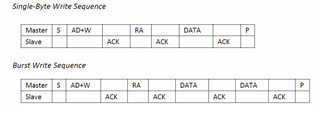Hello,
We are in the process of migrating to the nrf52840 and as such have decided to use the latest SDK (15.2).
As part of the migration we are trying to do a TWI write without a stop or repeated start condition using the nrf twi manager (by dividing it into two transfers, one with the register address and one with the data to write that has variable length). Basically the following: 
We are able to send a write command followed by no stop and a repeated start with the data but our slave device does not respond to this command. We are able to go around the issue by sending a single transfer packet with the register address in the first byte of the buffer but not all of our drivers will be easy to modify with this change. Is there a way to do this using the nrf_twi_mngr OR the driver directly? After perusing the documentation and the source code, we were not able to find a solution that did not require modification of the SDK.
There is an old thread with a similar question that has gone un-answered so any help will be greatly appreciated.
Thanks,
JP


